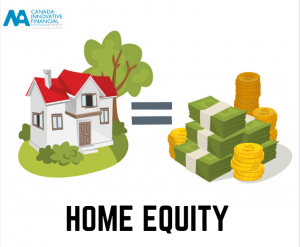This is just a quick note to let everyone who is looking to buy a home know that they can max out their RRSP contribution room before the 2nd of March and get a tax receipt for this year AND be able to use up to $35,000 per person under the Home Buyers Plan.
(more…)What line of credit mortgage means and how it can be beneficial for you
You can experience unexpected expenses in your life. You may need money for maintenance or to complete a home project. In such cases, you need to access the assistance of a trusted financial partner who can offer the right suggestion to get you out of the financial need. Canada Innovative Financial is one such mortgage service that offers you timely assistance to manage your financial difficulties with ease. Mortgage brokers can offer you a line of credit mortgage that is better than a regular unsecured loan. You can access money on demand for a set period. Line of credit mortgages offer you flexibility. You can borrow the money, pay it back, and repeat the process as necessary. When you access the assistance from the best mortgage experts in Canada, you can experience the following benefits with a line of credit:
Access To Instant Cash
You are gain access to credit immediately as required. You never have to wait a long time for processing. Without a delay in getting the funding, you can manage your financial needs without undue stress.
Lower Interest Rate
When you access the line of credit loan from the financial experts like Canada Innovative Financial, the interest rates are low. You pay less interest in this type of loan compared to others. Another important feature is that you pay interest only for the amount you use and not the entire amount available to you. The less expensive loans help you deal with your financial difficulties without the fear of huge interest charges.
Tax-Deductible Interest
The line of credit loan can be tax-deductible if you are borrowing for the purposes of a qualifying investment. So, when you pay the interest, you can add your income tax savings. You need to talk to your tax advisor for more details.
Use Funds for Any Purpose
When you take a line of credit mortgage, it is not limited to buying or completing projects for your home. You can use it for any purpose that requires immediate financial attention. If you have a secure job and can meet your financial obligations, and enough equity in your home, you have a good chance of approval.
To access the advantages offered, you need the assistance of the best mortgage broker like Canada Innovative Financial. The financial experts update you with the market changes and ensure you get the best deals without any hassles. Click on bc-mortgage-broker.ca to get assistance from experts to manage your financial problem with ease.
FIRST TIME HOME BUYERS MORTGAGE BROKER TIPS AND TRICKS
Among the services I provide to my clients,I consider myself to be a “first-time home buyer mortgage broker”. As a first time home buyer mortgage broker, I know how difficult it is to get into the real estate
GOOD NEWS REGARDING OSFI RULE CHANGES
This is just a quick note to let viewers know that IF you are one of the people with 20% or more down-payment and are in a position that the new OSFI rule changes affect your pre-qualification, that I can extend the
Is a debt consolidation mortgage a good choice help become debt-free?
Leading a life with overwhelming debt is difficult. An overpowering debt in retirement with restricted salary can be significantly harder. If you have previously investigated various approaches to deal with debt, you may have run across information regarding debt consolidation, which combines different debts into one payment. It will work if the debt isn’t inordinate and you have great credit and an arrangement to hold debt under tight restraints. Debt consolidation moves debts with high interests, for example, bills of credit cards, into one payment of lower interest. It can pay off your all out debt and rearrange it so you pay it off quicker.
In case you’re managing a reasonable measure of debt and simply need to rearrange numerous bills with various loan costs, installments and due dates, debt consolidation is an excellent strategy to achieve this.
What is working mechanism of debt consolidation?
There are two essential approaches to merge debt, the two of which concentrate the debt installments into one month to month bill:
1. A credit card balance transfer feature and no interest:
Transfer every one of your debts onto this card and cover the equalization during the limited time frame. Some credit card companies will offer promotions such as this.
2. A debt consolidation loan with a fixed interest rate:
Use the cash from the loan to clear off your debt, at that point repay the loan in regular installments over a pre-decided term.
There is a wide range of ways that you can opt for debt consolidation. You can get a home equity line of credit (HELOC), home refinancing to get money out of that equity, or get an approval of a personal loan from any bank or comparative monetary institution. The best choice for an individual relies upon his credit rating and profile, just as the ratio of debt to-income.
Is debt consolidation a good idea?
A debt consolidation loan generally must meet the below criteria:
- Your debt payments including mortgage payments doesn’t surpass 42% of your gross income.
- Your credit is strong to obtain a low interest card, line of credit or debt consolidation loan of low interest.
Here’s a situation when debt consolidation will be helpful Suppose you have 4 credit cards that have a rate of interest ranging from 18.99% to 24.99%. You generally make your installments on a scheduled date, so your credit is great. You may fit the bill for an unsecured debt consolidation loan at a much lower rate of interest, for example an interest rate of 7% — a much lower rate of interest.
For some individuals, debt consolidation uncovers a promising finish to your current circumstances and a fresh start to the future. If you obtain a loan that has a term of 3 years, you realize it will get cleared off in 3 years — provided that you make your installments on schedule and control your spending. On the other hand, making minimum installments on your credit cards will create months or years before you pay the dues.
Consolidating debt is an excellent idea that you should investigate. Find out all the choices that are available to you and pick the one that bodes well for your circumstance. If you own a home and have some equity in it, we can help you with consolidating your debt to increase your cashflow and save you money. Call us today at 604-318-1292.
Retain Financial Stability with Line Of Credit Mortgages
If you are thinking of a line of credit that is secured by a mortgage against your home then consider HELOC (A home equity line of credit) mortgage. A HELOC similar to home equity loans can allow homeowners to borrow money against the built up equity in their home. Such mortgages depend on a varying rate that fluctuates with the prime rate of the Bank of Canada. On the other hand, the rate of interest is usually higher than a variable rate mortgage. However there is no need to select between them. HELOCs may offer you the borrowing flexibility but they also come with some risks, mainly financial discipline.
Is A HELOC A Savior In Emergency Financial Situations?
Irrespective of if you require to enhance your kitchen or get your leaky roof fixed, any home improvement or repairing project will never come cheap. For instance, remodeling of an average kitchen will cost almost $19,450 and the average roof replacement can be around $6000. If you do not have that much money in your bank account, you will require to borrow the find for remodeling or repairing.
HELOCs will give you flexibility to borrow and repay the money that you borrow. But you must be well disciplined when you borrow funds and repay the lenders. Also remember that to qualify for a HELOC you require to have the ratio of your debt to income in the lower 40s or less than that, a credit rating of 620 or more and a home value which is at least 20% greater than you actually owe.
How Will A HELOC Work?
In simple terms, a HELOC will appear to work almost like a credit card. You can borrow money up to a specific credit limit that is approved by the lender beforehand. As a homeowner, you need to repay the borrowed funds as well as the interest. Such an option can come with more flexibility i.e.; you can withdraw and make repayments on daily or weekly basis if needed.
A HELOC may act similar to a credit card and give you constant access to the equity of your home, but it has a big difference when it is related to your credit rating. Some credit bureaus will treat HELOCs of a specific size such as installment loans instead of revolving lines of credit. It means that if you borrow the total limit of your HELOC, it won’t create the same negative impact that maxing out a credit card would have. Similar to a line of credit, taking a new HELOC will affect your credit score.
Is the First-Time Home Buyer Incentive helpful at all?
On September 2nd, the federal government implemented the First-Time Home Buyer Incentive, which is a program they had announced in the federal budget this spring. It’s aim is supposed to be to help first-time home buyers to get into their first home.
It is curious timing that they would call an election 9 days later, but I will get to that later. For now, more about this new program. (more…)
OSFI B20 MORTGAGE GUIDELINE CHANGES 2017 – PART 2
Among the services I provide to my clients,I consider myself to be a “first-time home buyer mortgage broker”. As a first time home buyer mortgage broker, I know how difficult it is to get into the real estate
The age-old question “Is it a good time to buy a home?”
In my time as a mortgage broker, there have been many instances when I have been asked “Is it a good time to buy a home?” If you were to hear the words of many Realtors, you would hear the words “Its a great time to buy a home”. This may sound self serving, and to some extent, that may be correct. The subject of this post is to dig deeper as to when it is a good time to buy, and what constitutes a good time to buy a home.
Vancouver mortgage broker with “lower” fees
I have had a in interesting case with a returning client who came to me recently for help with his mortgage. As a mortgage broker in Vancouver, it is necessary to be creative in making solutions work for my clients, which currently can often involve secondary or private lending solutions. This was a case where such creativity would be necessary. (more…)



